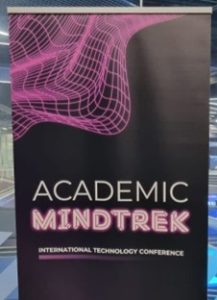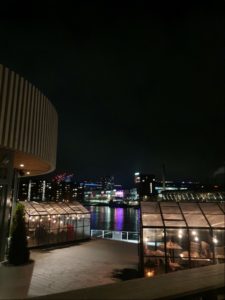post by Emma Gentry (2021 cohort)
In November 2022 I was accepted to present my PhD plans at Mindtrek’s Doctoral Consortium in Tampere, Finland. With the exception of one prior conference, until this point, I had only presented to academics and peers within the CDT, so I was delighted to be given this opportunity. Mindtrek is an international technology conference held every year in collaboration with Tampere University. With its strong focus on human-computer interaction and future technology, I was eager to immerse myself in all that the conference had to offer during this stage of my development as an early career researcher. In what follows I reflect on my experience of attending a doctoral consortium for the first time, offering key takeaways for PhD students looking to attend similar events in the future.
The event was brought to my awareness when I came across a post in the CDT impact group written by one of our Horizon alumni, Velvet Spors. Velvet offered a great deal of insight about the benefits of attending such an event. Reflecting on this moment I feel grateful to be part of the CDT community with access to an abundant network of researchers and alumni. I would strongly advise talking to PhD students/alumni in similar areas to see what kinds of events and conferences they recommend. I’m very glad to have established a connection with Velvet before attending Mindtrek.
The conference lasted a total of three days and was set up as a hybrid event, though I was fortunate enough to attend in person. For the doctoral consortium itself, we were asked to deliver a 10-minute presentation followed by a 10-minute discussion with four panel experts. Trying to explain your PhD in 10 minutes or less is always a challenge (especially when it’s a 2-minute flash presentation on Industry Day), but it is a skill that is so important to develop for effectively communicating and ‘selling’ your research to others. Reflecting on this experience I realised the importance of prioritising what you talk about, placing emphasis on why the contribution is important, and illustrating what other people might gain from your work.
The depth of the feedback I received from the doctoral consortium exceeded my expectations and each panel expert had a different angle of the PhD to comment on. I ultimately learned the importance of saying what’s out of scope for the PhD and being ok with not knowing the answer to a question, especially in the very early stages when you are still ironing out the specifics of your project. The doctoral consortium panel provided extensive suggestions for where I could take my research based on their expertise. I think the exposure you have to go through in the early stages can be quite daunting but also necessary for your development as a researcher. It’s helpful to think that everyone on the panel started somewhere and probably had a similar experience at their first doctoral consortium/conference.
The following days comprised the main part of Mindtrek’s academic conference where I came across many exciting tracks relevant to my PhD topic. The tracks I found particularly interesting were “Understanding and Designing for the Socio-Technical” and “Fictional, Speculative, and Critical Futures”. The focus of my PhD was still very much open at this point, and I felt inspired by many of the talks in these tracks. As part of the Horizon CDT program, we are encouraged to take awareness of upcoming, novel, and creative methods given the interdisciplinary nature of the training centre. The Mindtrek conference was ultimately a perfect opportunity to expose myself to a range of creative methods and to broaden my horizons in this way. Networking events were held in the evenings after conference hours which provided a more relaxed environment to speak with researchers and panellists. I always find it helpful to ask PhD students in the later stages of their doctorate, and even those with many years of experience after their PhD, what they wish they’d done earlier on.
The event enriched my career as a researcher in a multitude of ways. As well as developing my presentation skills further, I learned how to effectively communicate my project to an audience outside of the CDT. I was encouraged to think about the impact my PhD might have afterwards, and how I might engage with key stakeholders. For example, how might I disseminate my recommendations in a way that would make the most impact? It’s easy to get caught up in the theory of a PhD but recognising the real-world impact you can achieve is essential.
To sum up, I would highly recommend attending a doctoral consortium to anyone in the early stages of their PhD. I ultimately learned the importance of keeping an open mind in the early days and accepting that your project may change a lot from your original plan. You also need to have the exposure to be guided in the right direction. It may feel challenging to take this step but expanding your comfort zone is necessary for growth.


